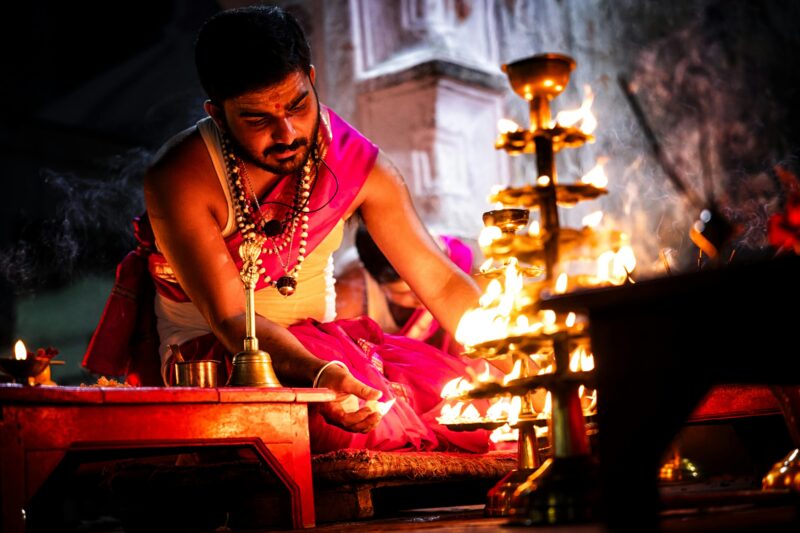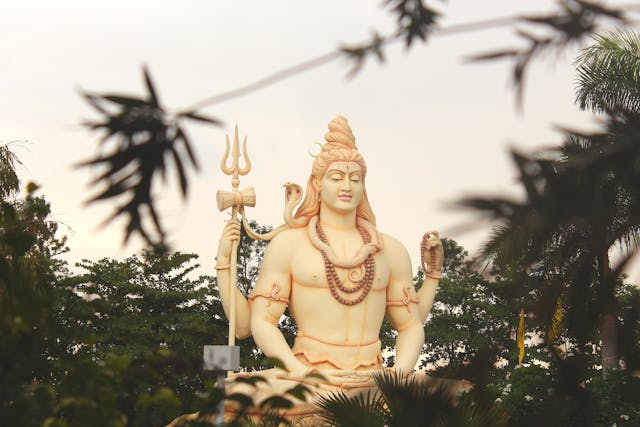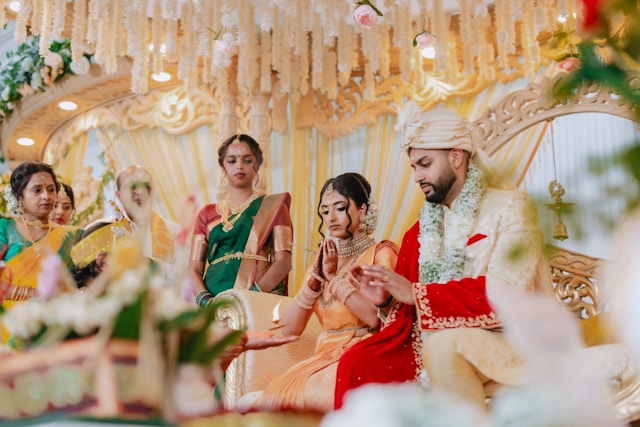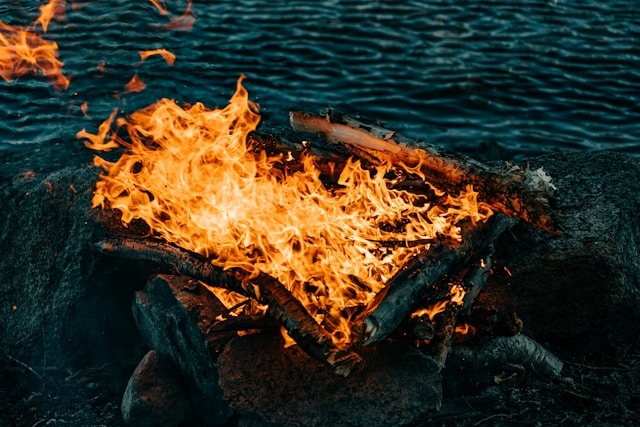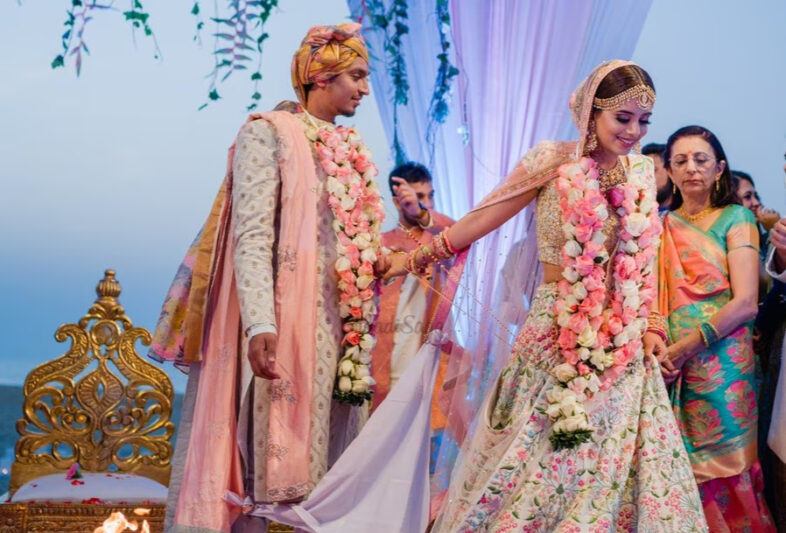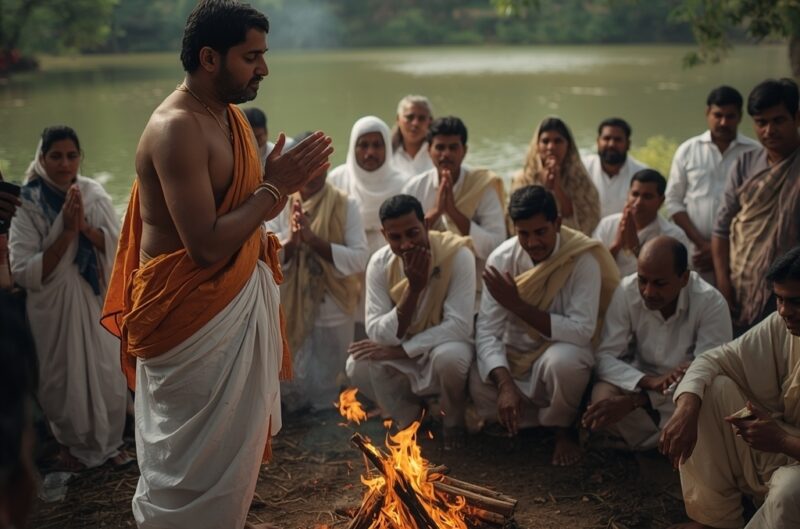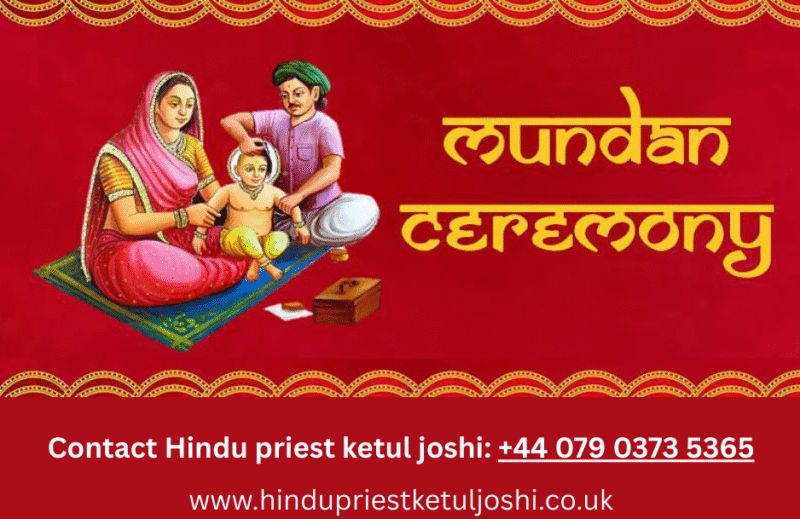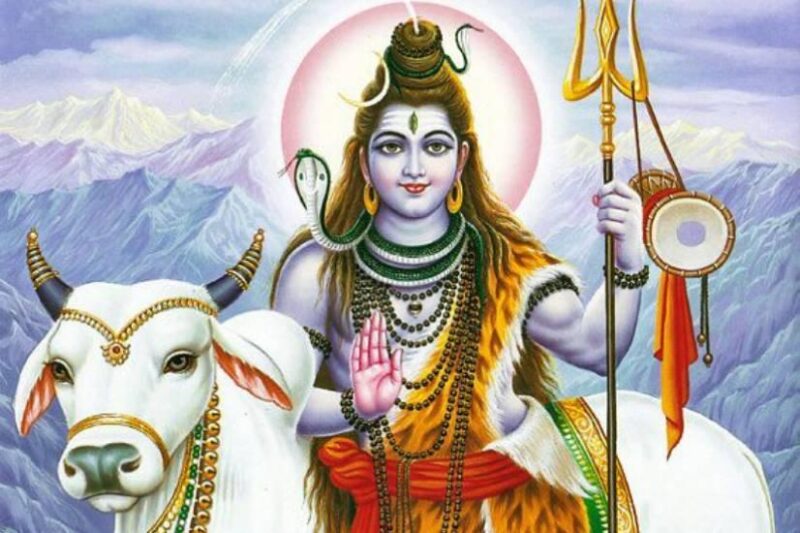Hindu Funerals in the UK A Guide to Planning Costs and Customs

Hindu Funerals in the UK A Guide to Planning Costs and Customs like in many other cultures, are deeply rooted in traditions and customs. Here’s a guide covering customs, costs, and planning for Hindu funerals in the UK:
Hindu Funerals in the UK A Guide to Planning
Hindu Funerals in the UK A Guide to Planning Costs and Customs
Planning a Hindu funeral in the UK involves balancing traditional practices with the practicalities of modern funeral services. Here’s a comprehensive guide to help with the planning process:
1. Initial Steps
- Informing the Community:
- Notify family members, friends, and community members about the passing. This may involve reaching out to the local Hindu temple or community center to help coordinate support and attendance.
- Contacting a Hindu Priest (Hindu funeral priest):
- Role: The Hindu priest will guide the family through the necessary rituals and prayers.
- Finding a Hindu Priest: Contact local Hindu temples or cultural organizations to find a Hindu priest who can perform the ceremonies.
- Choosing a Funeral Director:
- Specialized Services: Some Hindu funeral directors have experience with Hindu customs. Look for those who can accommodate specific needs such as cremation and traditional rites.
- Initial Consultation: Discuss your requirements and ensure they understand and can facilitate the necessary customs.
2. Funeral Arrangements
- Preparation of the Body:
- Hindu Funeral Rituals: The body is typically washed and dressed in traditional attire (often white or simple clothing). Close family members might perform these rites, or a funeral home may assist.
- Transport: Arrange for the body to be transported to the funeral home or the crematorium if necessary.
- Venue:
- Hindu Temple: Some families choose to hold part of the funeral service at a Hindu temple, where rituals can be performed in a sacred setting.
- Crematorium: Most Hindu funerals involve cremation. Ensure the crematorium is equipped to handle the necessary rituals and has the flexibility to accommodate religious practices.
- Service Schedule:
- Ceremony Timing: Coordinate with the priest and funeral director to schedule the timing of the service and rituals.
- Viewing: Some families may have a viewing period before the cremation. Arrange this with the funeral director if desired.
3. Cremation Details
- Crematorium Services:
- Booking: Reserve a time slot with the crematorium. Ensure they understand the specific needs related to Hindu rituals.
- Rituals at the Crematorium: A family member, often the eldest son or a close relative, typically performs the act of lighting the cremation pyre. Confirm the crematorium’s policies and facilities for this process.
- Ceremonial Items:
- Supplies: Arrange for ceremonial items such as flowers, garlands, and any other required religious artifacts. These can be sourced from specialized suppliers or sometimes provided by the funeral director.
4. Post-Funeral Arrangements
- Handling Ashes:
- Collection: After cremation, collect the ashes from the crematorium.
- Disposal: Traditionally, ashes are dispersed in a holy river or another significant place. Coordinate this with family members and the crematorium if needed.
- Additional Rites:
- Shraddha Ceremony: This is a post-cremation ritual performed to ensure peace for the deceased’s soul. It may be scheduled a few days or weeks after the funeral and involves specific prayers and offerings.
- Community Gathering: Consider organizing a community gathering or memorial service to honor the deceased and provide support for grieving family members.
5. Legal and Practical Considerations
- Death Certificate:
- Obtaining: Ensure you have the official death certificate, as it is required for the cremation process and any legal paperwork.
- Documentation: Keep copies of all necessary documents for administrative and legal purposes.
- Financial Considerations:
- Costs: Be prepared for various costs including funeral director fees, crematorium charges, priest fees, and ceremonial items.
- Support: Look into any financial assistance available through community organizations or charities if needed.
6. Community and Support
- Local Hindu Organizations:
- Support Services: Engage with local Hindu organizations for support with funeral arrangements, community involvement, and additional resources.
- Counseling: Seek support from community or religious leaders if the family needs help coping with grief.
By following these guidelines, you can ensure that the funeral respects Hindu traditions while addressing practical needs and legal requirements in the UK.
Hindu Funerals in the UK A Guide to Costs-Hindu funeral cost UK
Hindu Funerals in the UK A Guide to Planning Costs and Customs
Understanding the costs associated with Hindu funerals in the UK can help you plan effectively and manage your budget. Here’s a breakdown of typical expenses and factors to consider:
1. Funeral Director Fees
- Basic Service Fee: This covers the essential services provided by the funeral director, including transportation of the body, handling paperwork, and coordination of the funeral arrangements.
- Approximate Cost: £1,500 to £3,000
- Additional Services: Fees for additional services such as preparation of the body, provision of a hearse, or extended use of the chapel.
- Approximate Cost: £200 to £500
2. Cremation Costs
- Crematorium Fees: The cost of using the crematorium facilities, which often includes the use of a chapel and the cremation process itself.
- Approximate Cost: £600 to £1,200
- Additional Charges: There might be extra fees for extending the time in the chapel, or for specific requirements such as a private viewing or ceremonial use.
- Approximate Cost: £100 to £300
3. Priest Fees
- Hindu funeral cost Uk for Priest’s Services: Many priests work on a donation basis, but some may have a fixed fee for performing the required rituals and ceremonies.
- Approximate Hindu funeral Cost Uk: £100 to £300 (or a donation based on local customs)
4. Ceremonial Items
- Traditional Items: Costs for items such as flowers, garlands, and other religious artifacts needed for the rituals.
- Approximate Cost: £100 to £300
- Special Requests: If specific items or arrangements are required, such as traditional clothing or specific offerings, these may incur additional costs.
5. Additional Costs
- Transport: If the body needs to be transported over long distances or between multiple locations (e.g., from home to the crematorium), additional transport fees may apply.
- Approximate Cost: £100 to £300
- Ashes Handling: Costs related to the collection and disposal of ashes, such as urns or special arrangements for spreading the ashes.
- Approximate Cost: £50 to £200
- Legal and Administrative Fees: Costs for obtaining death certificates and other necessary legal paperwork.
- Approximate Cost: £50 to £150
6. Post-Funeral Expenses
- Memorial Services: Costs associated with organizing a memorial service or community gathering, including venue hire and refreshments.
- Approximate Cost: Variable, depending on size and scale
- Shraddha Ceremony: A post-cremation ritual that may involve additional fees for religious services and offerings.
- Approximate Cost: £100 to £300
Additional Considerations
- Financial Assistance: Some community organizations or charities offer support for funeral costs. Check with local Hindu community groups or religious organizations for possible assistance.
- Pre-Paid Funeral Plans: To manage costs and reduce financial stress, some families choose to arrange pre-paid funeral plans. These plans can cover many of the costs outlined above and can be tailored to include Hindu customs.
- Insurance and Benefits: Look into any insurance policies or benefits that may cover funeral costs, such as life insurance or government assistance programs.
Summary
Estimated Total Costs:
- Basic Funeral Services: £1,500 to £3,000
- Cremation Fees: £600 to £1,200
- Priest Fees: £100 to £300
- Ceremonial Items: £100 to £300
- Additional Costs: £200 to £700 (transport, legal fees, ashes handling, etc.)
Grand Total Estimate: £2,500 to £5,500
By being aware of these costs and planning accordingly, you can ensure that the funeral is carried out according to Hindu traditions while managing financial aspects effectively.
Hindu Funerals in the UK A Guide to Customs
Hindu Funerals in the UK A Guide to Planning Costs and Customs
Hindu funerals in the UK follow traditions deeply rooted in ancient customs, but they are often adapted to accommodate the cultural and legal environment of the country. Here’s a guide to the customs typically observed during Hindu funerals in the UK.
1. Before the Funeral
- Preparing the Body: Traditionally, the body is washed, usually by close family members, and dressed in simple, clean clothes. A thread known as a “janeu” is placed on male Hindus, symbolizing spiritual purity. The big toes are tied together, and the hands may be placed in a prayer position.
- Hindu Funeral Prayers/Hindu Funeral Mantras and Rituals: A Hindu priest or elder might lead prayers at home before the body is taken to the Hindu funeral. These Hindu funeral prayers often include the chanting of mantras and offerings of rice balls (pinda) to ensure the soul’s safe journey.
2. The Funeral Ceremony
- Cremation: Cremation is the most common method of disposal of the body in Hinduism, symbolizing the release of the soul from its physical form. In the UK, cremations are conducted at crematoriums.
- Ceremony Details: The funeral ceremony typically involves the chanting of hymns and Hindu funeral mantras, led by a Hindu priest. The eldest son or a close male relative traditionally takes the lead in performing the final rites, which include symbolic offerings and lighting the funeral pyre or pressing the button for the cremation.
- Open Casket: While open caskets are not typical in traditional Hindu funerals, some families in the UK may choose to have a viewing before the cremation, allowing family and friends to pay their respects.
3. After the Funeral
- Ashes: After the cremation, the ashes are usually collected and may be scattered in a sacred river in India, like the Ganges, or in a local body of water in the UK, depending on the family’s preference.
- Rituals: Post-cremation rituals can vary, but they often include prayers and offerings on specific days, such as the 3rd, 10th, and 13th days after the funeral. These rituals are intended to help the soul in its journey to the afterlife.
- Mourning Period: The mourning period traditionally lasts for 13 days, during which the family may observe specific rituals, including refraining from celebrations, eating vegetarian meals, and visiting the temple.
4. Cultural Adaptations in the UK
- Legal Requirements: In the UK, funerals must comply with local laws, including the requirement that all cremations take place in a licensed crematorium.
- Cultural Sensitivity: Due to the multicultural nature of the UK, Hindu families may blend traditional customs with Western practices, such as including eulogies or using funeral directors who understand Hindu rites.
- Community Involvement: The Hindu community often plays a significant role in funerals, with extended family and community members coming together to support the bereaved family.
5. Challenges and Considerations
- Availability of Ritual Services: Depending on the region in the UK, finding a Hindu priest or facilities that cater to Hindu funeral rites may be challenging.
- Environmental Concerns: Scattering ashes in rivers or natural bodies of water in the UK is subject to environmental regulations, so families must comply with local laws.
6. Support and Resources
- Hindu Funeral Services: Several organizations and funeral directors in the UK specialize in Hindu funerals, providing services that adhere to both religious traditions and legal requirements.
- Community Organizations: Local Hindu temples and community groups can offer support and guidance, including assistance with rituals and finding appropriate venues for funeral and post-funeral ceremonies.
This guide provides about Hindu funeral an overview of the customs and practices typically observed during Hindu funerals in the UK, highlighting both traditional aspects and adaptations to the local context.
